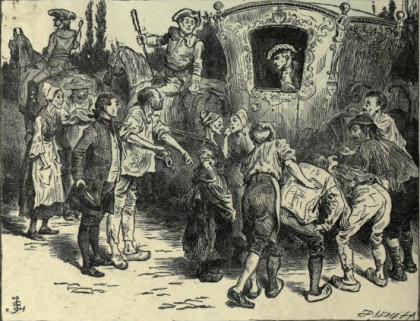
With a nod to the opening paragraph of Charles Dickens’ 1859 novel “A Tale of Two Cities” I find myself contemplating the ways in which life has never been better and never been worse. It’s a matter of perspective, of course.
For those of us well off, collecting social security and able to live on that in addition to a lifetime of savings, never before has so much material pleasure been widely available. We live lives more comfortable than any prince or princess of past centuries: foods from across the globe are available across the aisles in the supermarket, hot water flows on demand from faucets in our homes, clothing is easily available, inexpensive and attractive, modern medicine replaces joints, worn-out heart valves, and soothes pain, and technology provides instant global communication and easy access to cultural entertainment.
For those not well off–without savings, social security, health insurance, a safe and secure place to live, hungry and perhaps unable to work–the best of times it’s not. Finance capitalism has made debt slaves out of millions of people; the cost of living has grown ever higher making rents unaffordable and proper medical care out-of-reach. Life’s basic necessities–enough food, clean clothing and a dry place to sleep–harken back to the slums of Dickens’ Europe and lives of deep poverty. Often alone, undocumented, elderly and vulnerable, the poor remain the “whipping boys” of venal politicians and easy victims of cruelty and crime.
It’s tempting to conclude that nothing about human society ever really changes, that the rich and the poor will always be with us and that life is Dickensonian, that is, simply not fair. Past attempts to set the world on another course have not, admittedly, fared particularly well and have produced their own versions of the best and worst of times. Politics, the method people use to identify aspirations and seek to manifest them, demonstrates all the weakness and frailty of people themselves. Religion seeks to unify and make common cause, but it too succumbs to corruption, class division and conflict with non-believers. Art and culture stir the pot of human emotion, reminding us of our cruelty, foolishness and arrogance while also uplifting virtue and our lofty aspirations to goodness.
It’s equally tempting to decide “that life is what you make it.” This is both true and false, of course. Each of us is constantly making choices, even if at times our choice is to make no choice; not doing is a type of doing. Yet the idea that each person is autonomous is a fiction, a fantasy about human nature that’s never been true. Essentially, we are social creatures and dependent upon each other and the complicated imaginary social frameworks we collectively agree to call reality. Though many of us try to barricade ourselves psychologically and physically from others, it can’t be done. Even hermits need the knowledge and products of society to survive.
For those well off, knowledge that others suffer takes the gloss off comfort. Guilt, shame and compassion bring awareness of the worst to many of us who enjoy the best. Generosity can spring from that, but so can fear and greed. Thus, in all times, the best of human character sits uncomfortably adjacent to the worst, the most essential challenge of being human.
This is right on the money Larry. I work in Oakland and Berkeley once a week and on my way to those jobs I pass under a few freeways where the homeless live. If you want to be totally shocked then drive down to Oakland sometime on 27th street going west until you come to the freeway. Take a left and drive for a quarter mile. Nothing but trash, tents, shelters, dangerous looking folks….. poor homeless people, mostly African Americans for block after block… and it has gotten worse in the past few years for sure. It is as if Oakland does not know what to do with these folks and the trash that collects. I told my wife last week the city should at least supply them with a dumpster or something with weekly pickups. It is totally shocking. It is a disgrace to our country we call America that we allow this while we pour millions of dollars into corporate welfare programs and subsidy programs for the well to do… We should be ashamed.. I am. And then Id drive home to my comfy home in sonoma and have dinner and a bed. Or I get in my car and drive to my second home up north. It is something to really look at and question….. Our country needs help..